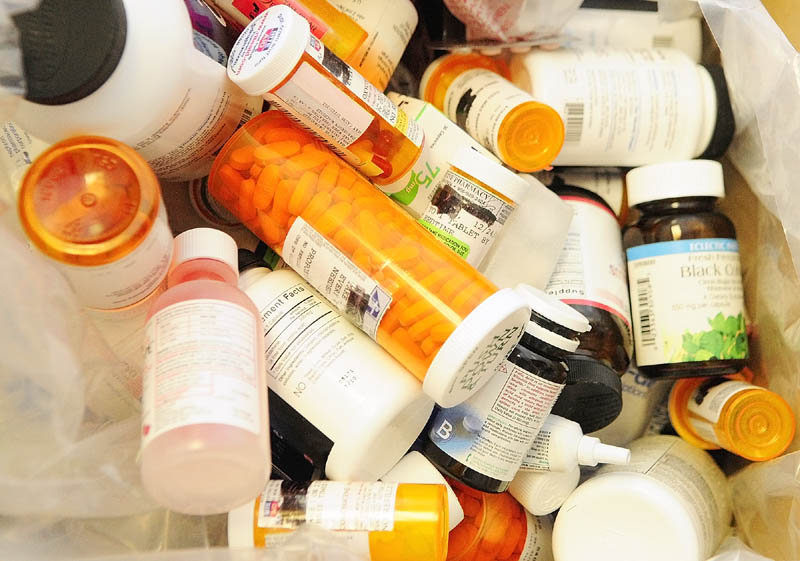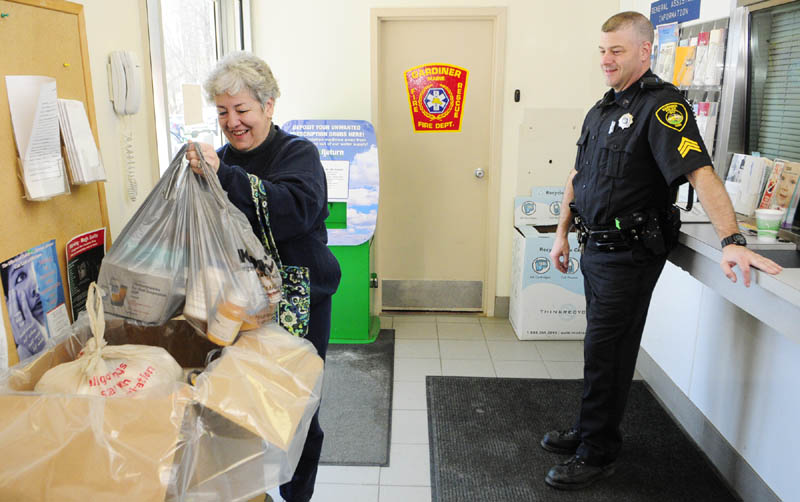GARDINER — Ervin Hoodlette shuffled into the Gardiner Police Department with a white kitchen trash bag about one-third full of various medications that he and his wife no longer take, or that had expired, and dropped them into a plastic-lined moving box as Sgt. Todd Pilsbury watched.
Local residents already had filled two similar boxes with unwanted medications Saturday morning. Pilsbury closed them up and prepared them to be taken to the Kennebec County Sheriff’s Office in Augusta, where drugs from many participating Kennebec County municipalities would be collected for later incineration.
It was only about halfway through the Drug Enforcement Administration’s National Take-Back Initiative. The event seeks to get unused and unwanted prescription drugs and other medication out of homes, off the streets and into incinerators so they can be destroyed before they end up in the wrong hands, or mouths — or down the toilet, where they could pass through sewage treatment systems and end up polluting water.
“We were just hanging on to them until we found something to do with them, like this,” the white-haired Hoodlette said of the medications. “I always had doubts about dumping them down the drain. I was just looking to do the right thing.”
He wasn’t alone. Pilsbury said other residents had brought in even more medications to be disposed of. He’s just happy to get the pills off the streets and out of homes, where the drugs could be the target of criminals, or could be taken by children or others for whom they were not intended.
Drugs could be dropped off at any of several collection points Saturday, including many police departments.
“It’s a good program because, A, they don’t flush them down the toilet; and, B, it gets them out of your home and makes you less of a target,” said Hallowell Sgt. Chris Hutchings, who helped collect drugs at the Police Department there. “People think it’s a great thing, because they don’t know what to do with their meds.”
Neill Miner, project director at the Southern Kennebec Alliance for Substance Abuse Prevention, stopped at the Augusta Police Department collection site early Saturday afternoon to see how the day was going.
“What this does is reduce access to pills,” he said. “It gets lots of meds out of people’s homes, so their nephew or family friend isn’t going to snatch them up and put it on the streets, or use it themselves.”
Augusta Sgt. Chris Shaw, who estimated by early afternoon Saturday that 20 or 30 cars had come by to drop off medications, filling two boxes and starting a third, said people don’t know what to do with their old medications. He said a lot of the medications belonged to people who died, and their relatives took them to collection sites.
Charlene Kinnelly dropped off a relatively small bag of her late mother’s pills Saturday at the Gardiner Police Department.
“Before we knew better, we probably would have dumped them down the toilet,” she said. “This makes a lot of sense. It’s a lot safer having them here than anywhere else.”
In addition to participating in the national collection day, Augusta, Gardiner, Richmond and Winthrop police, as well as the Kennebec County Sheriff’s Office, have drop boxes at their stations where people can bring unwanted medications anytime.
“People can access it right in our lobby, 24-7,” Richmond police Chief Scott MacMaster said of the box in Richmond. “It has been a popular little box.”
Even with the availability of the box anytime, MacMaster said, about 36 people brought medications to the collection day between 10 a.m. and 2 p.m. Saturday at the Richmond Senior Center.
“It sort of becomes a little social event at the senior center,” he said of the collection, “and it gives the senior center a chance to give out information about resources.”
In Richmond, the pills were dumped out of their plastic bottles, and the empty bottles were given to a woman who washes them out so they can be reused at an animal shelter, for pet medications.
MacMaster said they collected about 100 pounds of drugs, between Saturday’s event and the collection box at the police station.
The pills are accepted with no questions asked. Shaw said he generally doesn’t even look at what people bring in.
Miner said he’s concerned that the DEA, at some point, will stop funding the program. He said the cost of disposing of the drugs is expensive here because the pills are taken out of state to be incinerated. He said costs could be reduced significantly if the drugs could be disposed of at an in-state incinerator.
According to the Office of the Maine Attorney General, Maine consistently ranks first in the nation for the amount of drugs collected per capita during national drug take-back days.
In the most recent national event, in October last year, more than 244 tons of prescription medications were collected from the public nationwide, according to a news release from the DEA.
Keith Edwards — 621-5647
kedwards@centralmaine.com
Send questions/comments to the editors.





Success. Please wait for the page to reload. If the page does not reload within 5 seconds, please refresh the page.
Enter your email and password to access comments.
Hi, to comment on stories you must . This profile is in addition to your subscription and website login.
Already have a commenting profile? .
Invalid username/password.
Please check your email to confirm and complete your registration.
Only subscribers are eligible to post comments. Please subscribe or login first for digital access. Here’s why.
Use the form below to reset your password. When you've submitted your account email, we will send an email with a reset code.